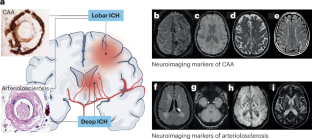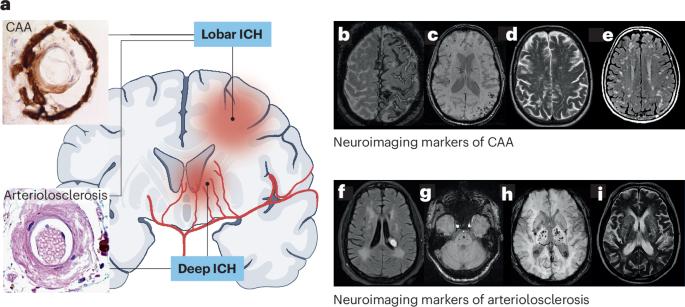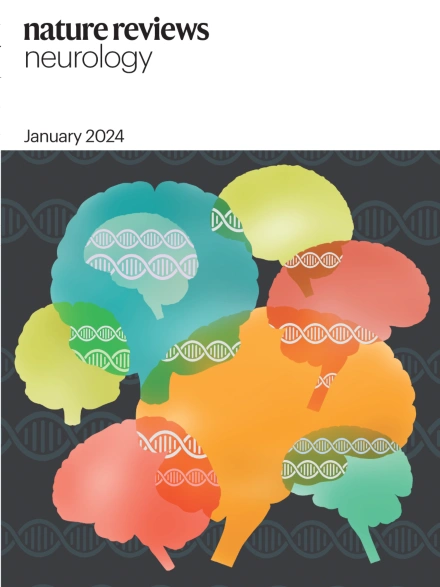Intracerebral haemorrhage — mechanisms, diagnosis and prospects for treatment and prevention
IF 33.1
1区 医学
Q1 CLINICAL NEUROLOGY
引用次数: 0
Abstract
Intracerebral haemorrhage (ICH) is a devastating condition associated with high mortality and substantial residual disability among survivors. Effective treatments for the acute stages of ICH are limited. However, promising findings from randomized trials of therapeutic strategies, including acute care bundles that target anticoagulation therapies, blood pressure control and other physiological parameters, and trials of minimally invasive neurosurgical procedures have led to renewed optimism that patient outcomes can be improved. Currently ongoing areas of research for acute treatment include anti-inflammatory and haemostatic treatments. The implementation of effective secondary prevention strategies requires an understanding of the aetiology of ICH, which involves vascular and brain parenchymal imaging; the use of neuroimaging markers of cerebral small vessel disease improves classification with prognostic relevance. Other data underline the importance of preventing not only recurrent ICH but also ischaemic stroke and cardiovascular events in survivors of ICH. Ongoing and planned randomized controlled trials will assess the efficacy of prevention strategies, including antiplatelet agents, oral anticoagulants or left atrial appendage occlusion (in patients with concomitant atrial fibrillation), and optimal management of long-term blood pressure and statin use. Together, these advances herald a new era of improved understanding and effective interventions to reduce the burden of ICH. Effective treatments for the acute stages of intracerebral haemorrhage are currently limited. In this Review, the authors consider advances in therapeutic strategies and neurosurgical procedures, including acute care bundles, that promise a new era of interventions.


脑出血--机制、诊断以及治疗和预防前景。
脑内出血(ICH)是一种破坏性疾病,死亡率高,幸存者会留下严重残疾。针对 ICH 急性期的有效治疗方法非常有限。然而,治疗策略随机试验(包括针对抗凝疗法、血压控制和其他生理参数的急性期护理捆绑疗法)和微创神经外科手术试验取得了令人鼓舞的结果,使人们对改善患者预后重新燃起了乐观的希望。目前正在进行的急性期治疗研究领域包括抗炎和止血治疗。要实施有效的二级预防策略,就必须了解 ICH 的病因,这涉及血管和脑实质成像;使用脑小血管疾病的神经成像标志物可改善与预后相关的分类。其他数据强调,不仅要预防复发性 ICH,还要预防 ICH 存活者发生缺血性中风和心血管事件。正在进行和计划进行的随机对照试验将评估预防策略的效果,包括抗血小板药物、口服抗凝剂或左心房阑尾闭塞术(适用于合并心房颤动的患者),以及对长期血压和他汀类药物使用的优化管理。这些进展共同预示着一个新时代的到来,人们可以更好地了解并采取有效的干预措施来减轻 ICH 的负担。
本文章由计算机程序翻译,如有差异,请以英文原文为准。
求助全文
约1分钟内获得全文
求助全文
来源期刊

Nature Reviews Neurology
医学-临床神经学
CiteScore
29.90
自引率
0.80%
发文量
138
审稿时长
6-12 weeks
期刊介绍:
Nature Reviews Neurology aims to be the premier source of reviews and commentaries for the scientific and clinical communities we serve. We want to provide an unparalleled service to authors, referees, and readers, and we work hard to maximize the usefulness and impact of each article. The journal publishes Research Highlights, Comments, News & Views, Reviews, Consensus Statements, and Perspectives relevant to researchers and clinicians working in the field of neurology. Our broad scope ensures that the work we publish reaches the widest possible audience. Our articles are authoritative, accessible, and enhanced with clearly understandable figures, tables, and other display items. This page gives more detail about the aims and scope of the journal.
 求助内容:
求助内容: 应助结果提醒方式:
应助结果提醒方式:


